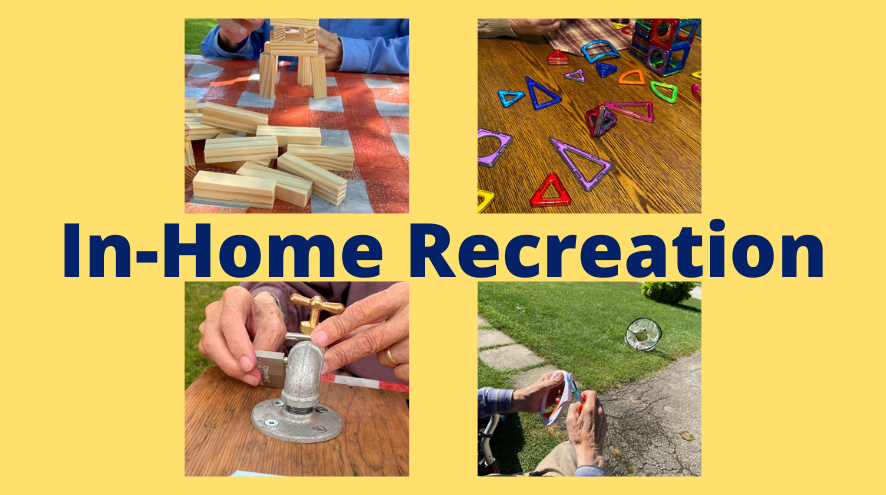In-Home Recreation Program
The In-Home Recreation Program is a one-on-one visiting program for people living with Alzheimer’s disease or other dementia.

If you are interested in becoming a volunteer companion or are a family member and would like more information about the In-Home Recreation Program, contact the Alzheimer Society at Huron 519-482-1482 / 1-800-561-5012 or Perth 519-271-1910 / 1-888-797-1882 or info@alzhp.ca.
Interested volunteers can also fill out the online application form and return it to the Volunteer Coordinator, Paulina Balch at paulinab@alzhp.ca.
What is In-Home Recreation?
Through In-Home Recreation, volunteers or In-Home Recreation Coordinators (IHRC) are matched with a person living with dementia.
- Volunteers or IHRC visit with the person living with dementia weekly or bi-weekly, during their preferred time either over the telephone, virtually, or in-person following public health guidelines.
- These visits provide socialization and meaningful activity to the individual.
- They also give the family care partner an opportunity for respite and assist them in keeping the person they care for at home longer.
The benefits of In-Home Recreation
There are benefits for everyone involved in this program.
For the person living with dementia
- Reduces isolation
- Provides meaningful activity and social interaction
- Assists in maintaining current skills
- Fosters a sense of pride and respect in themselves
- Provides a new friend to share interests, time, and companionship with
For the family care partner
- Assists in keeping the family member at home longer
- Provides a needed break from caregiving responsibilities
- Provides peace of mind knowing their family member is being cared for and is having an opportunity for additional social interaction
For the volunteer
- Provides a new friendship that improves the quality of life for the person living with dementia
- Develops a sense of achievement, a feeling of giving back, and belonging
- Provides an opportunity for personal growth, skill development, social interaction, and community relationships
How the Alzheimer Society can help
The Alzheimer Society Huron Perth will assist care partners, clients, and volunteers throughout all aspects of the program.
- We are available for questions or assistance and will maintain contact with the volunteer and family to ensure the visits are beneficial.
- We will develop a visiting schedule that doesn't interfere with other responsibilities and will work with the family and the volunteer to develop an activity plan.
- We also offer a free, comprehensive training program for the volunteers. This is designed to teach volunteers more about dementia, communication strategies, and visiting tips so they feel prepared for their role as a volunteer.
Activity ideas
What can be done as an activity? Remember – Volunteers and people living with dementia can do what ordinary friends like to do!
Here are some activity ideas:
- Reminisce
- Take part in a favourite hobby
- Play a game
- Listen to music or sing together
- Create a craft
- Take a walk together
- Look at photo albums or pictures
Together Apart: A Guide to Visiting from a Distance
Staff from the Alzheimer Society of Peterborough, Kawartha Lakes, Northumberland, Haliburton, the Alzheimer Society of Oxford and the Alzheimer Society of Ontario have written and produced this Guide in response to COVID-19 to help reduce the social isolation people living with dementia are facing, which you can download below.
The reality is that people living with dementia faced social isolation regularly before COVID-19 but with physical distancing a requirement, the isolation has intensified. Fully knowing the value of our volunteer visitors in the lives of our clients living with dementia and their care partners and the connection between the volunteer and the person living with dementia, we wanted to respond by equipping our volunteers to change their in-person visits to virtual visits.
Although our initial goal was to equip our volunteers with a resource that would help them in their virtual visits, we realized that family members could also use the Guide to help them in connecting and spending time with their family member living with dementia.
We hope this resource will be very helpful to you as a volunteer, family or friend visitor and that it will bring joy to your life and the person who is living with dementia.
